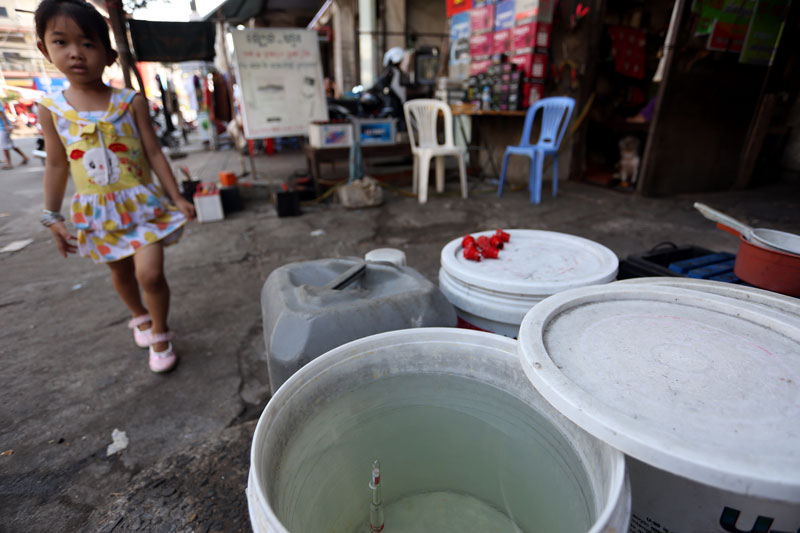“What law? No one has ever come to speak to me about that,” said 33-year-old Lim Vannak, scanning the large plastic buckets of corrosive acids she had lined up on the pavement of Phnom Penh’s Street 144 on a recent morning.
Acid in the wrong hands is as deadly as any other lethal weapon, and in Cambodia, where attacks with the devastating chemical are a common means of revenge and retribution, traditionally used by the scorned party in a love affair, laws have been passed to regulate the trade in acid.

But, more than a year after a sub-decree was approved regulating the sale, distribution and possession of strong acid in Cambodia, Ms. Vannak and other vendors across Phnom Penh continue to sell the lethal substance without any knowledge of the law.
“I know myself not to sell it [to just anyone],” explained Ms. Vannak, who bought her stocks of acid from Vietnam.
“No one has told me about the law,” said Kheng San, another roadside acid vendor on Street 110, who plans to sell his stock at 7,000 riel [about $1.75] per liter, most likely for use in jewelry fabrication.
The Sub-Decree on the Formalities and Conditions for Strong Acid Control, signed by six ministries and approved on January 31, 2013, came into effect six months later, and regulates the sale, purchase, storage, transportation, packaging, and use of all types of strong acid.
Only people aged 18 and above are able to purchase strong acid, according to the sub-decree, and anyone buying acid must be able to produce some form of identification and an explanation of their legitimate need for the substance, which is used by engine mechanics, jewelers and on rubber plantations.
Mr. San readily admitted that he didn’t bother checking customers’ identification documents when they come to buy acid, because he has a better method of identifying potential chemical attackers.
“I ask everyone questions about what they want to use the acid for,” Mr. San explained in earnest.
“If it sounds like they don’t know [what to do with acid], I won’t sell it to them,” he said.
Uncovering a large bottle of acid marked “Corrosive” from beneath a pile of towels, Mr. San said he didn’t believe that the acid on sale in his shop was dangerous.
Mr. San’s confidence aside, dozens of people, young and old, have been attacked with acid in the past decade, including people so badly burned that they have died from their injuries.
And since the sub-decree was introduced in July, there have been three reported acid attacks, two suicides involving acid and five accidents involving the substance. In total, three people have died from acid-related incidents during that short period of time.
While there has been a decrease in violent acid attacks since 2012, according to the Cambodian Acid Survivors Charity (CASC), there has been a small increase in accidents over the past period.
“While acid attacks seem to be going down, without strict regulation of the sub-decree, accidents and suicides could continue increasing,” said CASC project manager Erin Bourgois, adding that after one year, it is still unclear which ministry is responsible for enforcing the acid law.
“It’s even unclear for us who is in charge,” she said. “We’re happy the government passed it [the sub-decree] but if there’s no dissemination, people might not know about it.”
One of the signatories enabling the law, the Council of Ministers, denied responsibility for enforcing the sub-decree saying that it was a matter for the Interior Ministry.
“The law has been discussed and signed. We [the Council of Ministers] are just signatories on it…it is being enforced by the Ministry of Interior,” Council of Ministers spokesman Phay Siphan said.
Ministry of Interior Secretary of State Prum Sokha, however, said he had not heard of the decree.
A new academic paper released on Sunday in the Cambodian Law and Policy Journal states that for the law to work the government needs to start enforcing the decree.
In “Achieving Justice for the Survivors of Acid Violence in Cambodia,” Sharon Beijer, who authored the paper, says that having introduced the legal framework, “What is needed now is effective implementation of laws and regulations, a task for the Cambodian judiciary in cooperation with the Cambodian government.”
Ms. Bourjois of CASC agreed: “We can only do so much, we need the government to clarify which ministry is in charge of it and implement it.”




